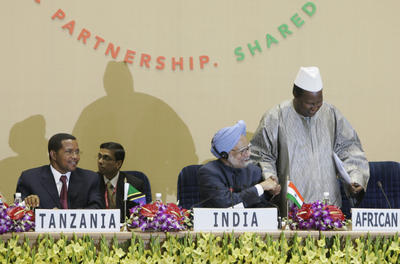Encouraged by a confident government, but also seeing opportunities on its own, the Indian private sector is getting involved in foreign investment and pushing the government to engage with Africa more consistently and to expand its network. Like investors from other emerging economies, India sees Africa as an important supplier and customer to drive growth. As India generates and absorbs hi-tech, it is ready to transfer intermediate technology more suited to developing economies, and invest, even though returns are not going to be large or fast.
Last month, India took significant steps to engage economically with the whole African continent of 53 nations. Re-working plans rolled out in New Delhi in 2008, the Second India-Africa Summit in Addis Ababa was a landmark development. Indian Prime Minister Manmohan Singh pledged US$5 billion over three years in development support, US$700 million for 80 new institutions and training programmes and US$300 million for an Ethiopia-Djibouti railway line.
The Summit declaration announced that ‘Africa is determined to partner in India’s economic resurgence as India is committed to be a close partner in Africa’s renaissance’. The African Union also came out in support of India’s claim for a permanent seat in the United Nations Security Council.
Prime Minister Singh also unveiled a gift package for Tanzania, which included US$191 million in credits and grants for development projects and a 300-bed hospital to be set up by the India-based Apollo Hospitals.
India’s state-run oil firms have already invested in countries including Nigeria and Kenya. Coal and diamond firms have invested across Africa. New embassies in Niger and Malawi have been opened to assist firms with securing uranium for India’s fast growing nuclear power industry.
India is keen to leverage its global expertise in the information technology, agriculture and human resource sectors in African countries, many of which face similar developmental hurdles to those India is grappling with.
Last August, India launched the second phase of the African e-network project. The stated aim of the project is to connect all members of the African Union via a satellite and fibre optic network. The project is equipped to support e-governance, e-commerce, infotainment, resource mapping, meteorological and other services, as well as providing VVIP connectivity among heads of states of the African countries through a highly secure closed satellite network.
Over 1,700 African students have already registered with Indian universities for tele-education courses. Regular tele-medical consultations have started between African doctors and Indian specialists through this network. Nearly 700 tele-lectures have been delivered by Indian doctors.
India is also keen to trumpet its cultural links with African countries, citing a shared history of imperialism and trade routes established centuries ago. The two million Indian diaspora in Africa engage in teaching, business and have contributed to the industrialisation of many nations.
Various comparisons with China, who moved in well after India, but has forged way ahead, are inevitable. India was relegated to the sidelines when China arrived in Africa seeking resources and energy, and offering financial riches New Delhi could not match.
China boasts foreign exchange reserves of more than US$3 trillion, 10 times India’s US$307 billion, and has aggressively used state owned development banks to invest heavily in oil, gas and other resource industries across the continent.
Total trade between India and African countries stood at US$46 billion last year, still less than half of China’s US$108 billion in 2008, but a huge increase on US$3 billion in 2000-1. India hopes to boost this to US$70 billion by 2015.
After losing a series of bids for oil rights and infrastructure projects to China, India has embarked on a new approach to Africa that blends trade and investment with development economics.
‘India’s approach is reciprocal, expecting access to resources in exchange for developing technology and training Africa’s human resources. That’s how India is different from other foreign powers,’ says Suresh Kumar, head of Delhi University’s African Studies Department. India’s thrust rides on its private sector. With China, it is state-to-state, even if the investors are private companies.
Former Indian foreign secretary Muchkund Dubey dismisses the India-China rivalry talk as ‘negative’. A degree of competition yes, but he says there is enough space for both to operate in Africa.
Mahendra Ved is a New Delhi-based writer and columnist.

